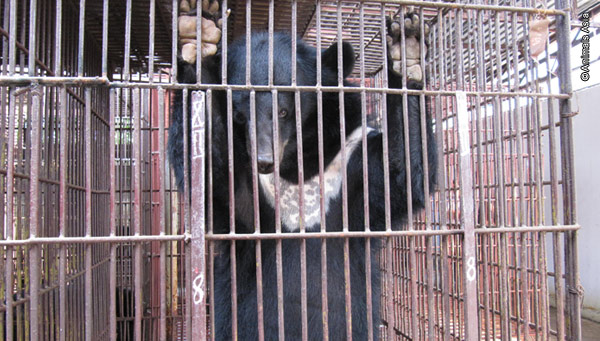Animal welfare foundation Animals Asia has just rescued 14 moon bears, which had been farmed and abused for a substance produced in their gall bladders. Gah. People are willing to perpetrate some real atrocities on animals in order to get valuable commodities — rhino horns, elephant ivory, tiger parts. But man, once you start doing horrible things to bears just so you can get their gallbladder secretions, you really need to step back and take a look at your life.
The moon bears have undergone gruesome conditions in the name of extracting bile, an important ingredient in a number of Chinese medical remedies. The bile can bring in between $600 and $20,000 per 2.2 pounds, for the sake of which the bears are penned up and cruelly mistreated, as Animals Asia founder Jill Robinson discovered while getting a cleaned-up-for-outsiders tour of a bear bile farm:
As the others were ushered into a bile shop, Robinson broke away and slipped downstairs into a dark basement where the bile bears, some of them skeletally thin, lived inside foul-smelling cages. "I could see shadows inside, and I could hear popping vocalizations," she says. "The closer I got to the cages, the louder and more frantic these vocalizations became. I realized that my presence was causing them anxiety that something horrible was going to happen." The memory of that day still evokes tears.
(It gets worse so I'm going to end the blockquote there.)
Animals Asia has been closing bile farms, rescuing moon bears, and rehoming them in sanctuaries:
Since 2000, Robinson’s foundation has negotiated the closure of 43 Chinese bile farms and the release of 277 bears. It learns about the farms from government officials and the public. The damaged creatures cannot survive in the wild, so Animals Asia has set up a bamboo-shaded sanctuary on 33 acres near Chengdu, in Sichuan Province. Here, they have access to grassy enclosures equipped with hammocks, wading pools, and climbing bars. They enjoy fresh fruits and vegetables, quality medical care, and the company of one another. The foundation runs a second sanctuary in Vietnam, where it has rescued 90 bears.
The worst part is that a synthetic replacement for bear bile exists — Western medicine even makes use of it. Unlike rhino horn, it really is kind of a miracle ingredient, but there's no need to mistreat bears to get it. (It's made from bile from cattle killed for meat, though, so if you don't support that, it's a whole other thing.) Not only that, but farmed bear bile can have severe side effects (besides making you literally the worst person for life if you're involved in its production), and the artificial stuff can't.
Image: Animals Asia



